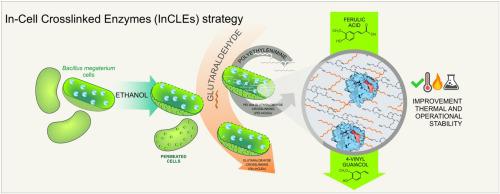Process Biochemistry ( IF 4.4 ) Pub Date : 2021-07-29 , DOI: 10.1016/j.procbio.2021.07.020 Victor Contreras-Jácquez 1 , Daniel A. Grajales-Hernández 2, 3 , Mariana Armendáriz-Ruiz 2 , Jorge Rodríguez-González 2 , Elisa M. Valenzuela-Soto 1 , Ali Asaff-Torres 1 , Juan Carlos Mateos-Díaz 2

|
In-Cell Crosslinked Enzymes (InCLEs) is a procedure to improve the thermal and operational stability of Bacillus megaterium intracellular decarboxylase activity, allowing to obtain enhanced whole-cell biocatalyst to produce 4-vinyl guaiacol (4VG). InCLEs were achieved using a fixed amount of biomass in a two-step procedure: 1) permeation of the membrane cell for reactants diffusion, and 2) intracellular proteins crosslinking. To optimize InCLEs preparation, 7.68 mg of biomass in the presence of different ethanol concentrations (10–50% v/v) were permeated, subsequently, the intracellular proteins were crosslinked with a glutaraldehyde/biomass ratios of 0, 1.63 and 3.26 μmol/mg. At the best conditions (10% v/v ethanol and 1.63 μmol/mg), thermostability increases 4.7-fold against the permeated uncrosslinked biocatalyst (PUCB). To further enhance the stability, the internalization of different molecular weight polyethyleneimine (PEI, 1.09 mg/mL) was evaluated. PEI-InCLEs using 25 kDa PEI, showed a half-life 68-fold higher than PUCB (1 min) at 50 °C. After 7 cycles (26.3 mM ferulic acid, pH 7), PEI-InCLEs retained 83 and 69% of the decarboxylase activity at 40 and 50 °C, producing 32.7 and 29.8 μmol of 4VG, respectively. Here we demonstrated that the InCLEs procedure is an effective strategy to obtain stable whole-cell biocatalysts for the production of high-valued biotechnological molecules.
中文翻译:

细胞内交联酶:提高巨大芽孢杆菌全细胞生物催化剂对阿魏酸脱羧的稳定性
细胞内交联酶 (InCLEs) 是一种提高巨大芽孢杆菌热稳定性和操作稳定性的程序细胞内脱羧酶活性,可以获得增强的全细胞生物催化剂,以生产 4-乙烯基愈创木酚 (4VG)。InCLEs 是使用固定量的生物质在两步程序中实现的:1) 渗透膜细胞以进行反应物扩散,以及 2) 细胞内蛋白质交联。为了优化 InCLEs 制备,在不同乙醇浓度 (10–50% v/v) 存在下渗透 7.68 mg 生物质,随后,细胞内蛋白质以 0、1.63 和 3.26 μmol/mg 的戊二醛/生物质比进行交联. 在最佳条件下(10% v/v 乙醇和 1.63 μmol/mg),相对于渗透的未交联生物催化剂 (PUCB),热稳定性提高了 4.7 倍。为了进一步提高稳定性,评估了不同分子量聚乙烯亚胺(PEI,1.09 mg/mL)的内化。使用 25 kDa PEI 的 PEI-InCLE 在 50 °C 下显示出比 PUCB(1 分钟)高 68 倍的半衰期。7 个循环(26.3 mM 阿魏酸,pH 7)后,PEI-InCLEs 在 40 和 50 °C 下保留了 83% 和 69% 的脱羧酶活性,分别产生 32.7 和 29.8 μmol 的 4VG。在这里,我们证明了 InCLEs 程序是获得稳定的全细胞生物催化剂以生产高价值生物技术分子的有效策略。



























 京公网安备 11010802027423号
京公网安备 11010802027423号